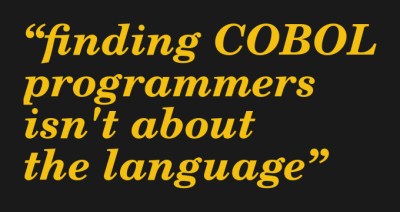Is history doomed to repeat itself? Or rather, is there really any doubt that it isn’t, considering recent events that made the news? I am of course talking about New Jersey’s call for COBOL programmers to fix their ancient unemployment system, collapsing under the application spikes caused by the COVID-19 lockdown. Soon after, other states joined in, and it becomes painfully apparent that we have learned absolutely nothing from Y2K: we still rely on the same old antiques running our infrastructure, and we still think people want to voluntarily write COBOL.
Or maybe they do? Following the calls for aid, things went strangely intense. IBM announced to offer free COBOL trainings and launched a forum where programmers can plug their skills and availability. The Open Mainframe Project’s COBOL programming course suddenly tops the list of trending GitHub projects, and Google Trends shows a massive peak for COBOL as well. COBOL is seemingly on its way to be one of the hottest languages of 2020, and it feels like it’s only a matter of time until we see some MicroCOBOL running on a Teensy.
However, the unemployment systems in question are unfortunately only a tiny selection of systems relying on decades old software, written in a language that went out of fashion a long time ago, which makes it difficult to find programmers in today’s times. Why is that?
In the end, COBOL is “just another language”, regardless of its age, and nothing stops anyone from learning it or developing with it. Just because it’s an old language doesn’t mean COBOL is entirely outdated and irrelevant either. Computer languages don’t “die”, they just go to sleep.
Or in the case of COBOL, it’s more that the areas where it makes sense to use the language are limited and highly specific. COBOL’s natural domain is reliable high volume data processing and it’s a perfect language for that use. COBOL is solely outdated as a general-purpose language.
So maybe the issue of finding COBOL programmers isn’t really about the language, but rather what its use implies about the systems using it, and the work environment one can expect. The thing is, those systems are a product of their times, where development processes and methodologies as we know them today simply didn’t exist, embedded in industries where software is merely seen as a tool, if not a nuisance. But COBOL itself is irrelevant here, we’d be in the same situation with any other language. Worse yet, if we don’t start to finally tackle the actual issues at hand, or at least learn from them, and continue to blame everything on an old language, history is going to repeat itself, and we will end up in this exact situation with other languages as well.
But what issues am I talking about then? Well, let’s start from the very beginning, and the lack of love for COBOL.
An Ode To COBOL
While virtually everyone has heard of COBOL in one way or another, and stating that someone …read more
Source:: Hackaday

